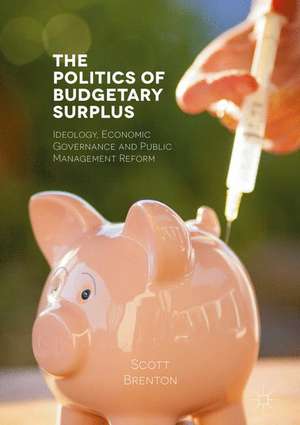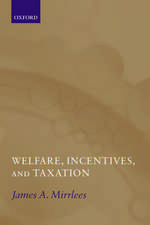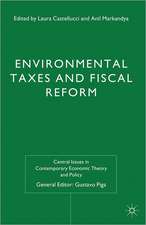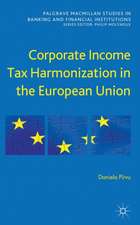The Politics of Budgetary Surplus
Autor Scott Brentonen Limba Engleză Hardback – 14 noi 2016
Preț: 386.81 lei
Nou
Puncte Express: 580
Preț estimativ în valută:
74.04€ • 80.45$ • 62.23£
74.04€ • 80.45$ • 62.23£
Carte tipărită la comandă
Livrare economică 21 aprilie-05 mai
Preluare comenzi: 021 569.72.76
Specificații
ISBN-13: 9781137585967
ISBN-10: 113758596X
Pagini: 226
Ilustrații: XV, 187 p.
Dimensiuni: 148 x 210 x 18 mm
Greutate: 0.39 kg
Ediția:1st ed. 2016
Editura: Palgrave Macmillan UK
Colecția Palgrave Macmillan
Locul publicării:London, United Kingdom
ISBN-10: 113758596X
Pagini: 226
Ilustrații: XV, 187 p.
Dimensiuni: 148 x 210 x 18 mm
Greutate: 0.39 kg
Ediția:1st ed. 2016
Editura: Palgrave Macmillan UK
Colecția Palgrave Macmillan
Locul publicării:London, United Kingdom
Cuprins
Chapter 1. The path towards surplus.- Chapter 2. Political strategies.- Chapter 3. Types of fiscal rules.- Chapter 4. Types of expenditure cuts.- Chapter 5. The effects on public management.- Chapter 6. The Global Financial Crisis and beyond.
Notă biografică
Scott Brenton is a political scientist in the Melbourne School of Government at the University of Melbourne, Australia. He has previously worked at the Australian parliament and held teaching and visiting appointments at Australian, British and Scandinavian universities. He has published widely on issues of democratic accountability.
Textul de pe ultima copertă
This book probes the hollow rhetoric of debt, deficits and austerity. It explores the decisions of parties of the left which have attempted to deflect criticisms of economic mismanagement and gain trust by depoliticising the budget process and financial management with various rules, albeit with elements of discretion. The book argues that this is a perverse form of trust as it is premised on the belief that political leaders and the public sector cannot be trusted to make appropriate decisions given the economic circumstances of the time and need rules, but at the same time that they can be trusted to follow the rules. The book also explores parties of the right, which often advocate stricter rules and which tend to be the least effective. The book describes how few conservative governments have admirable records on sustained surpluses, given a propensity for unsustainable tax cuts, and the future opportunities this provides to advance a political program of deeper spending cuts.
Scott Brenton is a political scientist in the Melbourne School of Government at the University of Melbourne, Australia. He has previously worked at the Australian parliament and held teaching and visiting appointments at Australian, British and Scandinavian universities. He has published widely on issues of democratic accountability.
Caracteristici
Compares the policies of centre-right and centre-left governments in handling budget surpluses Focuses on Anglophone countries (Australia, Canada, New Zealand, the United Kingdom and the United States) and makes comparisons with Sweden, Denmark, Norway and Germany Appeals to students and scholars of Politics, Public Management and Economics

















